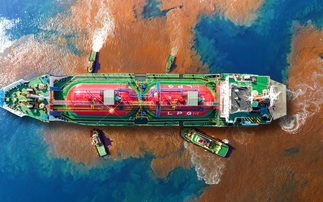Simon Zadek argues rating agencies should pay as much attention to environmental debt as they do financial debt
China's criticism that the US is failing to live within its means is a little rich given that it has benefited so much by the US's debt addicted, three decade long consumer binge. But that aside, China does have a point. And so does Standard and Poor in its historic downgrading of the US's credit worthiness, despite the dispute over an alleged US$2 trillion maths error deemed by S&P as 'neither here nor there'.
So how should sustainability geeks understand and respond as the world once more (or still) stands on the brink of a financial sector-precipitated economic and political crisis?
Well, there is the well-worn, finger wagging route taken by many that evokes the need for 'sustainable consumption', involving life style changes underpinned by technology, price, behavioural changes and for most value shifts. The World Economic Forum, perhaps an unlikely venue, has articulated this argument in and for the mainstream business and policy community, summarised in a recent piece entitled The Consumption Dilemma. Bottom line on this front: business says that efficiency measures along the value chain combined with technology adoption and further development, blended with some much needed business model re-engineering, can take us a long way. Civil society and some business argues that much public policy innovation and effective implementation is needed, and a few maintain that deeper value shifts will be needed to achieve the 30 to 40 per cent increase in resource productivity that McKinsey says is needed to meet growing consumer demands within our planetary capacity over the next two decades.
Anger towards the financial sector has a special place in many folks' hearts and minds right now. Allegations, often well-founded, have pointed fingers in particular towards predatory lending practices that have financed very unsustainable consumption. And the cheap credit tapped for this purpose that has flushed through the global economy has come of course through the Great Deregulation, especially of Wall Street and The City. This in turn provided the opening to recycle the huge financial surpluses arising from the global economic imbalances associated in significant part with the growth of China Inc.
This long con, however, has been made possible by some very dubious accounting practices. Imagine being asked to invest in an enterprise whose balance sheet omits a wide range of assets and liabilities that are likely to change in value enormously over the coming years. And furthermore, imagine on examining the prospectus one finds that free cash flow predictions were so heavily discounted beyond a few years that future scenarios were in essence irrelevant to the picture presented. And then finally imagine that the auditors brought in to stress test the prospectus was paid by the would-be investee and had a similar distaste for the long term.
Failing to account for natural resources and social externalities is a practice that will bring the house down. Sovereign debt credit ratings are meant to measure the credit worthiness of a country. but they do not count in the main their social and environmental assets, or the liabilities that they are building up in terms of domestic damage and international pushback and claims for recompense. Sustainability geeks all know the aggregate numbers, such as those offered up by UNEP, which estimates that annual environmental costs from global human activity already amounted to US$ 6.6 trillion in 2008, equivalent to 11 per cent of global GDP. The same study concluded on current trends that global environmental costs would reach US$ 28.6 trillion, equivalent to 18 per cent of projected global GDP, by 2050. But surely such data and the associated underlying thinking should feed through to credit ratings (and loads of other things), so undermining a key plank of the long con.
Relatively little work has been done on sovereign credit ratings and sustainability, although more has been done on corporate credit ratings and governance, often taken as a weak proxy for sustainability. One study by the Oekom Research highlights the high correlation between measures of a country's sustainability and their financial debt credit rating, highlighting interesting the exception of the US, which has a poor sustainability score by Oekom's measure compared to its credit rating.
Another more recent study by Bank Sarasin suggests that longer-term, sustainability factors are more accurate in predicting credit worthiness, "to a large extent, a country's long-term solvency depends on its future tax receipts. This requires a sustainable tax base, which needs to be mainly in the form of future goods and services. This depends on a country's available natural, social and economic resources and its efficiency in converting these resources into goods and services" (Bank Sarasin) . The World Economic Forum is now preparing its first 'sustainability competitiveness index' of countries, reinforcing the message that sustainability is a key basis for enhanced productivity and sustained wealth creation. This builds in part on the earlier work reported in the Harvard International Review in developing a country-level Responsible Competitiveness Index.
Credit rating agencies need to count in environmental and social externalities, and the work of Bank Sarisin, Oekom and others demonstrate proof of concept in practice. These externalities impact on productivity (the core to wealth creating economies), and so can and should be counted. Yet we sustainability geeks appear to be silent on the current financial and economic meltdown beyond the usual rage against greed. Perhaps awe and ignorance inform this silence, that we are persuaded that this calamity has nothing to do with sustainability as we understand it. Nothing could be further from the truth.
Simon Zadek works on sustainability issues worldwide and is a Senior Visiting Fellow at the recently established Global Green Growth Institute, Senior Visiting Fellow at the Centre for International Governance Innovation (CIGI) and advisor on sustainability to the World Economic Forum.
He is author of the award winning book The Civil Corporation and can be contacted at [email protected]






